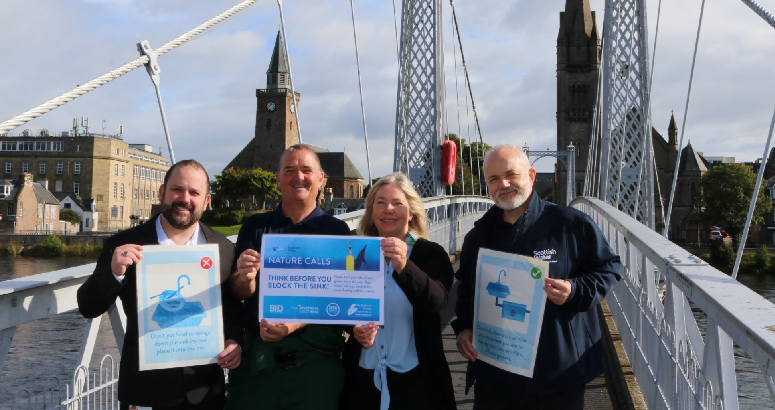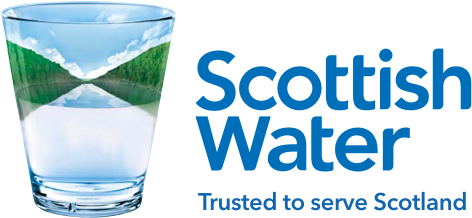Partnership approach to cut FOG from Highland sewers
17 November 2023
Local businesses have already helped to shape plans which are aligned with Scottish Water’s award-winning ‘Nature Calls’ campaign.
The incorrect disposal of fat, oil and grease – referred to as FOG – is estimated to be a factor in more than half of all blockages in Scotland’s sewer networks.
“Guided by data showing where problems occur most often, there is a real opportunity to be more proactive by working even more closely with businesses. We know that local businesses want to play their part in protecting the local environment which is so important to their success. They also want to prevent the avoidable misery, disruption and cost that blocked drains can bring.”
Ian Burnett
Scottish Water’s Waste Water Network Performance Manager
A new partnership approach to tackling the threat of fatbergs in city centre sewers is set to put the Highland Capital’s drains on a diet.
The incorrect disposal of fat, oil and grease – referred to as FOG – is estimated to be a factor in more than half of all blockages in Scotland’s sewer networks. Scottish Water teams attend an average of 100 blockages a day, each one with potential to cause the misery of flooding for homes and businesses, or to lead to pollution of the environment.
Analysis of issues reported to the publicly-owned water company identified a hotspot of 192 sewer chokes in the city centre of Inverness over a 3 year period, focused within less than half a square kilometre. In response, members of the local business community have been working with Scottish Water, The Highland Council and Zero Waste Scotland in recent months to develop new ways of engaging businesses that serve hot food – in order to raise awareness and make lasting improvements.
Local businesses have already helped to shape plans – including new posters and information for owners, managers and kitchen staff – which are aligned with Scottish Water’s award-winning ‘Nature Calls’ campaign. The new materials are now being used by Network Protection Officers from specialist partner Environmental Compliance & Services (ECAS), who are visiting take-aways, cafes, restaurants and hotels to check on FOG disposal arrangements and grease management systems.
Scottish Water’s Waste Water Network Performance Manager Ian Burnett said: “Scottish Water has worked with food businesses for many years in response to blockages caused by build-up of fat, oil and grease – often in combination with wet wipes and other items which should never be flushed down toilets or drains.
“Guided by data showing where problems occur most often, there is a real opportunity to be more proactive by working even more closely with businesses. We know that local businesses want to play their part in protecting the local environment which is so important to their success. They also want to prevent the avoidable misery, disruption and cost that blocked drains can bring.
“The sewer network in Scotland’s towns and cities faces real challenges which we are committed to working with all of our partners to address. While none of us can stop the intense rainstorms that have potential to overwhelm drains and sewers, we can work together to get rid of the FOG.”
The partnership approach being taken in Inverness has been supported by The Highland Council, Inverness Business Improvement District (BID), Visit Inverness Loch Ness and Zero Waste Scotland. It seeks to build on the early success of Scottish Water’s ‘Nature Calls’ campaign, which has contributed to a reduction in blockages caused by wet wipes in its first year; as well as leading calls for a ban on wipes containing plastic.
Thomas Machnik, who manages Café Ness by the Cathedral, attended a workshop which was held at the Palace Hotel in the Spring to discuss the approach and help shape materials for use in kitchens.
Thomas said: "I think it is a brilliant scheme and it should have been done years ago.
“The FOG advisors are not chargeable. They will guide us through the best way to tackle the problem.
“We need to think about it as not just a deep fat frying issue: milk, cheese, bacon; they all contribute.
“There are going to be some initial cost implications but it immediately protects the environment and the Inverness City Centre."
Specialists from Environmental Compliance & Services (ECAS) are visiting food service establishments focused in the area of the city centre where chokes are most common. Where they find a grease management system in a kitchen which is inefficient, they will provide advice on the improvements that should be made and support with raising awareness among relevant staff. They will then return at a later date to follow-up and confirm if action has been taken.
Alan Yates, Environmental Health Manager for the Highland Council said: “The Environmental Health team fully supports this partnership approach to tackling the issue of fats, oils and grease disposal in the sewer network. In addition to potential public health issues, the blockage of drains and sewers causes considerable disruption and clean-up costs to both the business community and members of the public. I would therefore encourage any food business to follow the guidance on disposal of FOG and understand the value in preventing such blockages. As part of the partnership working, our Environmental health team will be highlighting the issues of FOG disposal and offering guidance during routine food hygiene inspections.”
Facts:
- Fat, oil and grease in liquid form may not appear to be harmful but as it cools it congeals and hardens
- This can cause blockages to the inner lining of drainage pipes, leading to potential waste water flooding within properties, in streets and to the local environment
- In extreme cases, blocked sewers can spill into burns, rivers, streams, coastal waters and beaches, causing environmental damage
- Scottish Water deals with more than 36,000 blockages every year – costing around £7million to attend and clear
- The waste water drain which runs from individual properties to the public sewer is usually only about four inches wide, which is less than the diameter of a DVD
- Scottish Water maintains and improves over 30,000 miles of sewer pipes which take waste water away from homes and business premises across Scotland. We then treat this at over 1,800 waste water treatment works before returning it to the environment.
- Everything we all put down our plugholes, toilets and drains will all end up in the drains and sewers
- Whether it is saturated fat (like lard), mono-unsaturated fat (like olive oil) or vegetable oil, they all congeal and harden. The fat / oil content in leftover sauces and soup contributes to the same problems.
Further information on Scottish Water’s Nature Calls campaign is available at www.yourwateryourlife.co.uk/campaign/nature-calls.

Analysis of issues reported to the publicly-owned water company identified a hotspot of 192 sewer chokes in the city centre of Inverness over a 3-year period.
This was focused within less than half a square kilometre.







